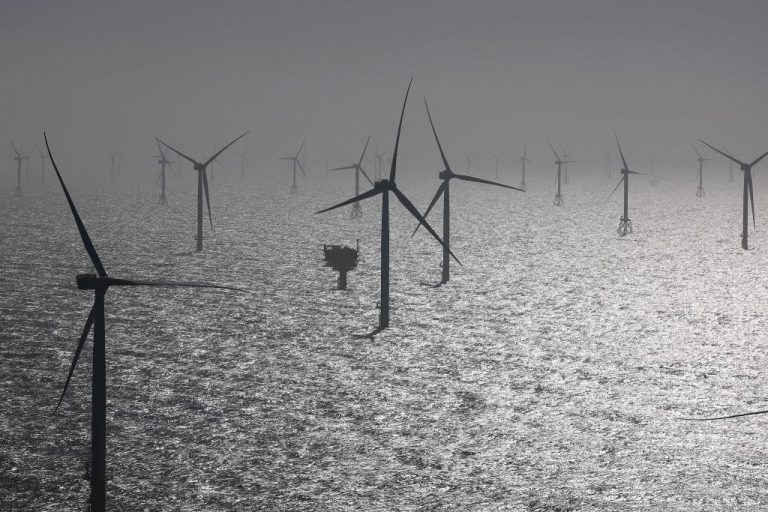The Pentagon has designated a large range of water in the U.S. East coast earmarked for leasing to install wind turbines to meet a Biden administration “green” energy goal as “highly problematic,” according to documents leaked to network media.
Several maps “shared with industry stakeholders” were published by Bloomberg in April 17 reporting on the topic, showing “vast red areas” earmarked by the Navy and the Air Force off the coasts of Maryland, Delaware, North Carolina, and Virginia.
The locations “are documented vividly on a map of Navy and Air Force concerns, dated Oct. 6, 2022, and circulated with industry and state stakeholders this month,” the outlet states.
In September 2022, The White House released a fact sheet stating the President had “set a bold goal” of installing 30 gigawatts of offshore wind energy as soon as 2030.
MORE ON WIND TURBINES
- Mass EV Adoption Will Crush Power Grid Unless Consumers Nudged Away From Night Charging: Stanford Study
- Forget Crickets. Soon, You’ll Eat Recycled Wind Turbines
- Worn-down Wind Turbines Headed to Landfills Because Recycling Is Too Expensive: Study
The note claims that the infrastructure, once installed, will power 10 million homes, produce 77,000 jobs, and “spur private investment up and down the supply chain.”
Success
You are now signed up for our newsletter
Success
Check your email to complete sign up
Offshoring wind power into the U.S. coastline was originally announced shortly after Joe Biden took office in March 2021, lauded by the White House as a boon for workers because it would generate “more than $12 billion per year in capital investment in projects on both U.S. coasts”
Bloomberg says that the opposition emerging from the Pentagon has “spooked” eastern U.S. states that aspire to “meet clean energy and climate goals” and power developers set to cash in on the projects.
An unnamed senior Department of Defense official confirmed the veracity of the paperwork as they were paraphrased as having “stressed that the maps represent an initial stage of discussions with the ocean energy bureau and that the Pentagon is committed to finding ways to accommodate leasing in the region.”
Kelly Flynn, a spokesperson for the Pentagon, told Fox News in same day reporting, “The initial assessment performed by DoD found complicated compatibility challenges with wind turbines near Navy and Air Force training.”
Flynn added that the assessment also “includes impacts to the environment, shipping, fishing, viewshed and military readiness” and discusses potential “mitigation strategies,” Flynn added.
Authors wrote that the Pentagon had “identified challenges” with conducting operations around the locations, as they sit in proximity to a North Carolina bombing range and a weapons station in Virginia.
Four of the six locations planned for development are “completely shaded red, including two deep-water parcels that might require floating turbines,” Bloomberg stated.
Bloomberg adds that the documents likely have worse bite than bark because “similar Defense Department concerns helped derail plans for offshore oil leasing in waters near Virginia’s coast roughly a decade ago.”
Financial consequences for those set to cash in are significant, the article notes, stating that the Interior Department was on the cusp of selling rights to developers early next year, but now, “Significant delays could make it harder for developers to claim newly expanded tax credits for the multibillion-dollar ventures that can take years to permit and build.”
An April 4 article by Bloomberg on the planned deployment of a football field-sized boat so large it requires 400 employees, sources its supply chain from 34 states, and developers declined to disclose the cost of, to service the turbine infrastructure stated that the tax credits were manifested from one of the Biden administration’s several multi-trillion dollar spending packages, the Inflation Reduction Act.
Senior Fellow at the Independent Women’s Forum’s Center for Energy and Conservation, Gabriella Hoffman, told Fox that the airing of the documents to the media gives groups opposed to offshore wind power installations the ammunition they need to dig in their heels.
“Many groups opposed to offshore wind have warned about this potential concern for years, but were ignored,” she stated before adding, “Now this report confirms their warnings. Wind proponents have some explaining to do.”
Hoffman, however, is an opponent of the administration’s net-zero agenda, calling the current government’s initiative a “hasty push for unreliable offshore wind” that will “bear horrible consequences for the environment and the economy.”















